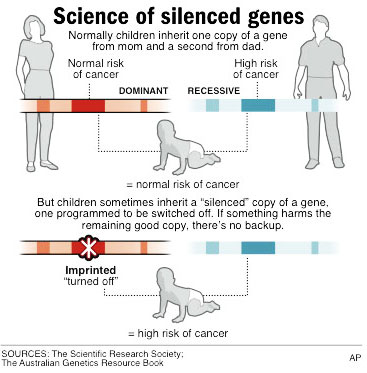GENE IMPRINTING (silencing) and
HUMAN HEALTH...
genetically predisposed to a health problem.
In organisms
that exhibit live birth each offspring
inherits one copy of a gene from mom and a second allele from dad, but
GENE IMPRINTING can results in some alleles
being “switched off”. Gene imprinting
occurs when certain
alleles
of particular
genes
function differently depending on whether they are inherited from the
paternal
or maternal
parent.
With only one functional allele being present in the offspring,
there is no backup, if that copy goes bad during a life span, that makes
the individual more vulnerable to genetic diseases.
Dr.
Randy Jirtle’s
research team at Duke have identified some 200 of these “silenced
genes,” which may play a real role in human health and how the
environment — food, stress, pollution — can interact with genes to help
determine why some people get sick and others do not. The list of
“imprinted” genes was published online Friday by the journal
Genome
Research.
|
Usually, people
inherit a copy of each gene from each parent and
both copies are active,
programmed to do their jobs whenever needed.
For some genes,
people inherit an active copy only from the mother or only from
the father. If one copy of a gene becomes mutated and
quits working properly, often the other copy could compensate.
Molecular signals tell, or “imprint,” the copy from the other parent to be silent. You could compare it to flying a two-engine airplane with one engine cut off. If the other engine quits, the the plane crashes. In genetic terms, if one tumor-suppressing gene is silenced and the active one breaks down, a person is more susceptible to cancer. |
 |
Using DNA sequences whose
patterns pointed to the presence of imprinted genes instead of active
ones, Jirtle’s team searched the
Human Genome Databases.
Many of the imprinted genes they found are in regions of chromosomes
already linked to the development of obesity, diabetes, cancer and some
other major diseases. For example, one of the imprinted genes appears to
prevent bladder cancer and a second appears to play a role in causing
various cancers and may affect epilepsy and bipolar disorder.
Researchers now can begin
to ask questions as: How behavioral or environmental factors may tip the
balance for someone who is genetically predisposed to a health problem?
and how
imprinting may be changed to reactivate an imprinted gene after birth.